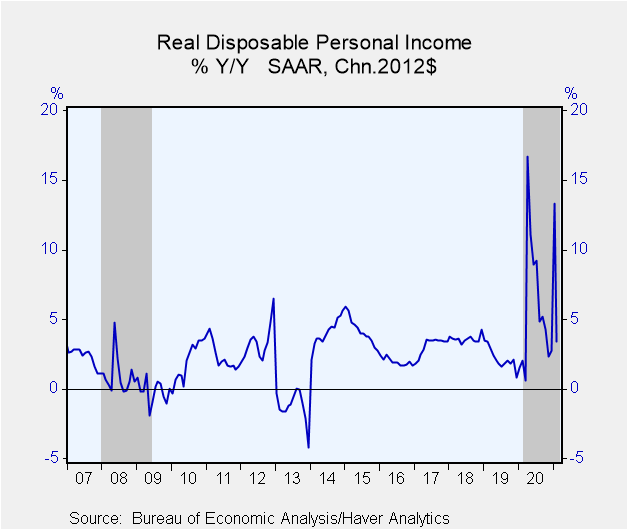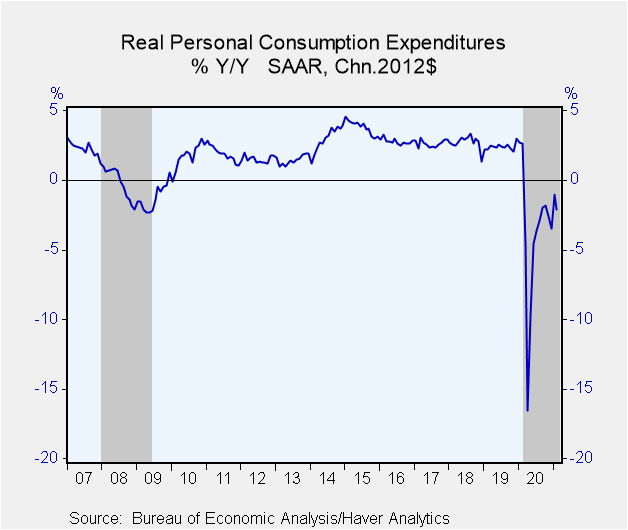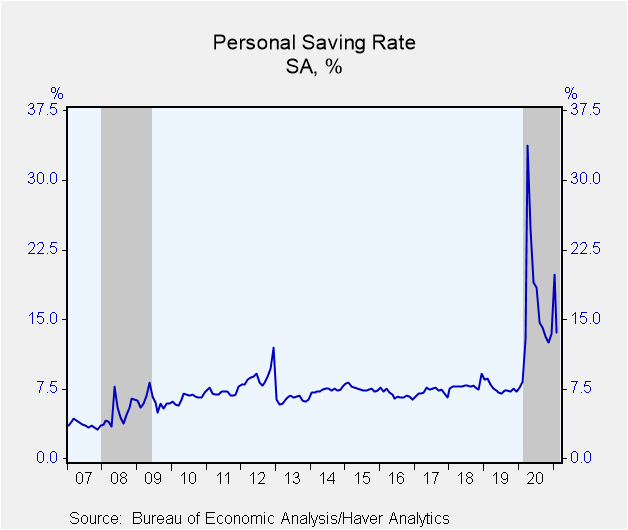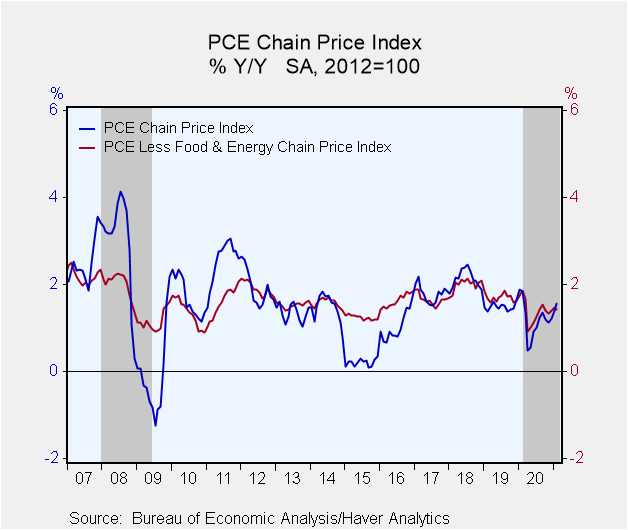 Global| Mar 26 2021
Global| Mar 26 2021U.S. Personal Income & Spending Decline in February
by:Tom Moeller
|in:Economy in Brief
Summary
• Total income falls but wage income holds steady. • Spending weakens across categories. • Pricing power moderates. Personal income weakened 7.1% (+4.3% y/y) during February following a little-revised 10.1% January jump. A 7.0% [...]
• Total income falls but wage income holds steady.
• Spending weakens across categories.
• Pricing power moderates.
Personal income weakened 7.1% (+4.3% y/y) during February following a little-revised 10.1% January jump. A 7.0% decline had been expected in the Action Economics Forecast Survey. Transfer payments declined 27.4% following the 52.2% January surge due to government stimulus checks. Wages & salaries held steady both m/m and y/y after rising firmly in each month since May. Proprietors' income jumped 2.3% (-4.8% y/y) after easing 0.1% in January. Rental income strengthened 1.3% (2.5% y/y) for a second consecutive month. Earnings on assets rose 0.5% (-3.1% y/y) as dividend income rose 0.7% (-4.0% y/y) and interest income improved 0.4% (-2.4% y/y). Disposable personal income declined 8.0% (+5.0% y/y) last month after improving 11.4% in January. Adjusted for price inflation, real disposable income fell 8.2% (+3.4% y/y) after strengthening 11.1% in January.
Snow and ice storms weighed on consumer spending last month. Personal consumption expenditures weakened 1.0% (-0.6% y/y) following a 3.4% January rise, revised from 2.4%. A 0.7% decline had been expected. Adjusted for price inflation, spending decreased 1.2% (-2.1% y/y) after rising 3.0%. The decline in spending reflected a 4.6% drop (+16.1% y/y) in outlays on durable goods, led by a 5.8% (+22.1% y/y) decline in spending on recreational goods & vehicles. Spending on furniture & appliances declined 5.1% (+13.3% y/y) while motor vehicle sales fell 4.2% (+14.1% y/y). Nondurable goods purchases declined 2.5% (+5.3% y/y). Clothing spending weakened 4.9% (+1.7% y/y). Food & beverage sales fell 1.7% (+10.0% y/y) after rising 5.9% while spending on gasoline edged 0.5% higher (-10.2% y/y). Real outlays on services eased 0.1% (-7.0% y/y) as restaurant & hotel spending fell 1.3% (+20.1% y/y) after a 6.9% January surge. Recreation services outlays rose 0.2% (-30.9% y/y) while transportation service outlays declined 1.4% (-25.5% y/y). Health care outlays eased 0.2% (-5.2% y/y) but housing & utilities spending improved 0.4% (1.5% y/y).
The personal savings rate fell to 13.6% in February from 19.8% in January. The rate reached a record high 33.7% in April. The level of personal saving rose by more than one-third in February (+73.5% y/y).
The PCE chain price index increased 0.2% (1.6% y/y) last month following a 0.3% January rise. The price index excluding food and energy edged 0.1% higher (1.4% y/y) after a 0.2% gain, revised from 0.3%. Energy prices jumped 3.8% (1.2% y/y), strong for the third straight month. Food & beverage prices rose 0.2% (3.3% y/y) after easing 0.1% in January.
The personal income and consumption figures are available in Haver's USECON database with detail in the USNA database. The Action Economics figures are in the AS1REPNA database.
Tom Moeller
AuthorMore in Author Profile »Prior to joining Haver Analytics in 2000, Mr. Moeller worked as the Economist at Chancellor Capital Management from 1985 to 1999. There, he developed comprehensive economic forecasts and interpreted economic data for equity and fixed income portfolio managers. Also at Chancellor, Mr. Moeller worked as an equity analyst and was responsible for researching and rating companies in the economically sensitive automobile and housing industries for investment in Chancellor’s equity portfolio. Prior to joining Chancellor, Mr. Moeller was an Economist at Citibank from 1979 to 1984. He also analyzed pricing behavior in the metals industry for the Council on Wage and Price Stability in Washington, D.C. In 1999, Mr. Moeller received the award for most accurate forecast from the Forecasters' Club of New York. From 1990 to 1992 he was President of the New York Association for Business Economists. Mr. Moeller earned an M.B.A. in Finance from Fordham University, where he graduated in 1987. He holds a Bachelor of Arts in Economics from George Washington University.










